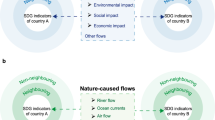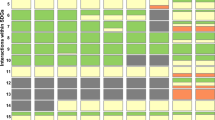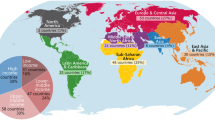Abstract
Promoting the Sustainable Development Goals (SDGs) must contend with the often siloed nature of governance institutions, making the identification of cooperative institutional networks that promote SDG targets a priority. We develop and apply a method that combines SDG interaction analysis, which helps determine prerequisites for SDG attainment, with the transition management framework, which helps align policy goals with institutional designs. Using Aruba as a case study, we show that prioritizing increased economic benefits from sustainable marine development, including those of tourism, provides the greatest amount of direct co-benefits to other SDGs. When considering indirect co-benefits, reducing marine pollution emerged as a key supporting target to achieve SDGs. The results also show that, as in many other small island states, sustainable ocean development in Aruba depends on international partnerships to address global issues—including climate change mitigation—over which it has little control. Using SDG relationships as a guide for institutional cooperation, we find that the institutions with the most potential to coordinate action for sustainable ocean development are those that address economic, social and international policy, rather than institutions specifically focused on environmental policy. Our results provide key methodologies and insights for sustainable marine development that require coordinated actions across institutions.
This is a preview of subscription content, access via your institution
Access options
Access Nature and 54 other Nature Portfolio journals
Get Nature+, our best-value online-access subscription
$29.99 / 30 days
cancel any time
Subscribe to this journal
Receive 12 digital issues and online access to articles
$119.00 per year
only $9.92 per issue
Buy this article
- Purchase on Springer Link
- Instant access to full article PDF
Prices may be subject to local taxes which are calculated during checkout




Similar content being viewed by others
Data availability
The authors declare that all data supporting the findings of this study are available in the paper and its Supplementary Information files.
References
Transforming Our World: The 2030 Agenda for Sustainable Development (UN, 2015).
Rotmans, J., Loorbach, D. & Kemp, R. in Complexity and Planning (eds de Roo, G. & Hillier, J.) 195–216 (Routledge, 2016).
Singh, G. G. Determining a path to a destination: pairing strategic frameworks with the Sustainable Development Goals to promote research and policy. Evol. Inst. Econ. Rev. https://doi.org/10.1007/s40844-020-00162-5 (2020).
Singh, G. G. et al. Mechanisms and risk of cumulative impacts to coastal ecosystem services: an expert elicitation approach. J. Environ. Manage. 199, 229–241 (2017).
Biermann, F., Kanie, N. & Kim, R. E. Global governance by goal-setting: the novel approach of the UN Sustainable Development Goals. Curr. Opin. Environ. Sustain. 26, 26–31 (2017).
Christie, P. Marine protected areas as biological successes and social failures in Southeast Asia. Am. Fish. Soc. Symp. 42, 155–165 (2004).
Gill, D. A. et al. Capacity shortfalls hinder the performance of marine protected areas globally. Nature 543, 665–669 (2017).
Cisneros-Montemayor, A. M. et al. Changing the narrative on fisheries subsidies reform: enabling transitions to achieve SDG 14.6 and beyond. Mar. Policy 117, 103970 (2020).
Loorbach, D. Transition management for sustainable development: a prescriptive, complexity-based governance framework. Governance 23, 161–183 (2010).
Nilsson, M., Griggs, D. & Visbeck, M. Policy: map the interactions between Sustainable Development Goals. Nature 534, 320–322 (2016).
A Guide to SDG Interactions: From Science to Implementation (International Council for Science, 2017).
Nilsson, M. et al. Mapping interactions between the Sustainable Development Goals: lessons learned and ways forward. Sustain. Sci. 13, 1489–1503 (2018).
Singh, G. G. et al. A rapid assessment of co-benefits and trade-offs among Sustainable Development Goals. Mar. Policy 93, 223–231 (2018).
Loorbach, D. Transition Management: New Mode of Governance for Sustainable Development (International Books, 2007).
Lang, D. J. et al. Transdisciplinary research in sustainability science: practice, principles, and challenges. Sustain. Sci. 7, 25–43 (2012).
Leontief, W. Input–Output Economics (Oxford Univ. Press, 1986).
Reid, A. J. et al. Post-2015 Sustainable Development Goals still neglecting their environmental roots in the Anthropocene. Environ. Sci. Policy 77, 179–184 (2017).
Griggs, D. et al. Policy: Sustainable Development Goals for people and planet. Nature 495, 305–307 (2013).
Singh, G. G. in Predicting Future Oceans (eds Ota, Y. et al.) 405–416 (Elsevier, 2019).
Robinson, J. Squaring the circle? Some thoughts on the idea of sustainable development. Ecol. Econ. 48, 369–384 (2004).
Keohane, R. O. & Victor, D. G. Cooperation and discord in global climate policy. Nat. Clim. Change 6, 570–575 (2016).
Bennett, N. J. et al. Towards a sustainable and equitable blue economy. Nat. Sustain. 2, 991–993 (2019).
Keen, M. R., Schwarz, A.-M. & Wini-Simeon, L. Towards defining the blue economy: practical lessons from Pacific Ocean governance. Mar. Policy 88, 333–341 (2018).
Cisneros-Montemayor, A. M. et al. Social equity and benefits as the nexus of a transformative blue economy: a sectoral review of implications. Mar. Policy 109, 103702 (2019).
Kemp, R., Parto, S. & Gibson, R. B. Governance for sustainable development: moving from theory to practice. Int. J. Sustain. Dev. 8, 12–30 (2005).
Halpern, B. S., Lester, S. E. & McLeod, K. L. Placing marine protected areas onto the ecosystem-based management seascape. Proc. Natl Acad. Sci. USA 107, 18312–18317 (2010).
Singh, G. G. et al. Mapping cumulative impacts to coastal ecosystem services in British Columbia. PLoS ONE 15, e0220092 (2020).
Cottrell, R. S. et al. Food production shocks across land and sea. Nat. Sustain. 2, 130–137 (2019).
Halpern, B. S. et al. A global map of human impact on marine ecosystems. Science 319, 948–952 (2008).
Munck af Rosenschöld, J., Rozema, J. G. & Frye-Levine, L. A. Institutional inertia and climate change: a review of the new institutionalist literature. WIREs Clim. Change 5, 639–648 (2014).
CEC EU 2009 Report on Policy Coherence for Development (European Union, 2009).
Obura, D. O. Getting to 2030—scaling effort to ambition through a narrative model of the SDGs. Mar. Policy 117, 103973 (2020).
Freire-Gibb, L. C., Koss, R., Margonski, P. & Papadopoulou, N. Governance strengths and weaknesses to implement the marine strategy framework directive in European waters. Mar. Policy 44, 172–178 (2014).
Douvere, F. The importance of marine spatial planning in advancing ecosystem-based sea use management. Mar. Policy 32, 762–771 (2008).
Farmery, A. K., Kajlich, L., Voyer, M., Bogard, J. R. & Duarte, A. Integrating fisheries, food and nutrition—insights from people and policies in Timor-Leste. Food Policy 91, 101826 (2020).
Fulton, E. A., Smith, A. D., Smith, D. C. & Johnson, P. An integrated approach is needed for ecosystem based fisheries management: insights from ecosystem-level management strategy evaluation. PLoS ONE 9, e84242 (2014).
Stafford-Smith, M. et al. Integration: the key to implementing the Sustainable Development Goals. Sustain. Sci. 12, 911–919 (2017).
Aruba 2019 Annual Research: Key Highlights (WTTC, 2019).
Ridderstaat, J., Croes, R. & Nijkamp, P. The tourism development–quality of life nexus in a small island destination. J. Travel Res. 55, 79–94 (2016).
Barendsen, P. B. et al. WildAruba Conservation Planning Workshop Final Report (IUCN/SSC Conservation Breeding Specialist Group, 2008).
Oduber, M., Ridderstaat, J. & Martens, P. The connection of vegetation with tourism development and economic growth: a case study for Aruba. J. Environ. Sci. Eng. 4, 420–431 (2015).
Fish, R. et al. Unruly pathogens: eliciting values for environmental risk in the context of heterogeneous expert knowledge. Environ. Sci. Policy 12, 281–296 (2009).
Ban, S. S., Pressey, R. L. & Graham, N. A. Assessing the effectiveness of local management of coral reefs using expert opinion and spatial Bayesian modeling. PLoS ONE 10, e0135465 (2015).
Martin, T. G. et al. Eliciting expert knowledge in conservation science. Conserv. Biol. 26, 29–38 (2012).
Brown, B. B. Delphi Process: A Methodology Used for the Elicitation of Opinions of Experts (RAND, 1968).
Singh, G. G. et al. Group elicitations yield more consistent, yet more uncertain experts in understanding risks to ecosystem services in New Zealand bays. PLoS ONE 12, e0182233 (2017).
Burgman, M. A. et al. Expert status and performance. PLoS ONE 6, e22998 (2011).
Burgman, M. Risks and Decisions for Conservation and Environmental Management (Cambridge Univ. Press, 2005).
Gu, Z. Circlize implements and enhances circular visualization in R. Bioinformatics 30, 2811–2812 (2014).
Csárdi, G. & Weiner, J. sankey: Illustrate the Flow of Information or Material. R package version 1.0.2 (2017); https://CRAN.R-project.org/package=sankey
Husson, F., Lê, S. & Pagès, J. Exploratory Multivariate Analysis by Example Using R (Chapman and Hall/CRC, 2017).
Van Der Maaten, L. Accelerating t-SNE using tree-based algorithms. J. Mach. Learn. Res. 15, 3221–3245 (2014).
Ashtiani, M. CINNA: Deciphering Central Informative Nodes in Network Analysis. R package version 1.1.53 (2019); https://CRAN.Rproject.org/package=CINNA
Csardi, G. & Nepusz, T. The igraph software package for complex network research. InterJournal 1695, 1–9 (2006).
Acknowledgements
We acknowledge support from the Nippon Foundation Ocean Nexus Center at the University of Washington EarthLab, the Nippon Foundation Nereus Program and the Ocean Frontier Institute, through an award from the Canada First Research Excellence Fund. We also acknowledge support from the IOC of the UNESCO Sub-commission for the Caribbean and Adjacent Regions and the UNESCO IHP, through the regional office in Cuba, as well as the Departamento Meteorologico Aruba for hosting the workshop.
Author information
Authors and Affiliations
Contributions
G.G.S. designed the study. G.G.S. and M.O. organized and ran the workshop. G.G.S. assembled the data. G.G.S. and A.M.C.-M. analysed the data. G.G.S., M.O., A.M.C.-M. and J.R. wrote the manuscript.
Corresponding author
Ethics declarations
Competing interests
The authors declare no competing interests.
Additional information
Peer review information Nature Sustainability thanks David Obura and the other, anonymous, reviewer(s) for their contribution to the peer review of this work.
Publisher’s note Springer Nature remains neutral with regard to jurisdictional claims in published maps and institutional affiliations.
Supplementary information
Supplementary Information
Supplementary Figs. 1–6 and Tables 1–10.
Supplementary Data 1
Data on SDG relationships.
Supplementary Data 2
Data on dimensions that regulate context-dependent relationships.
Supplementary Data 3
Data on institutional relationships.
Rights and permissions
About this article
Cite this article
Singh, G.G., Oduber, M., Cisneros-Montemayor, A.M. et al. Aiding ocean development planning with SDG relationships in Small Island Developing States. Nat Sustain 4, 573–582 (2021). https://doi.org/10.1038/s41893-021-00698-3
Received:
Accepted:
Published:
Issue Date:
DOI: https://doi.org/10.1038/s41893-021-00698-3
This article is cited by
-
Sustainable development pathways for energies in Yangtze River Delta urban agglomeration
Scientific Reports (2023)
-
Perspectives in global environmental governance
Global Public Policy and Governance (2023)
-
Achieving SDG 14 in an equitable and just way
International Environmental Agreements: Politics, Law and Economics (2023)
-
A framework to harness effective partnerships for the sustainable development goals
Sustainability Science (2022)



